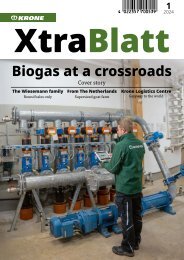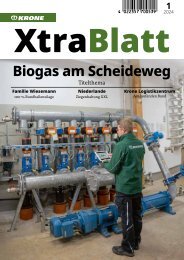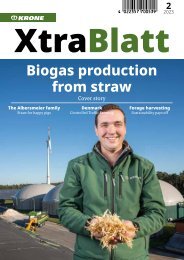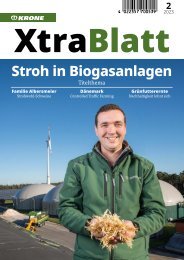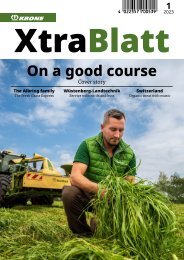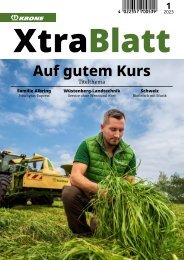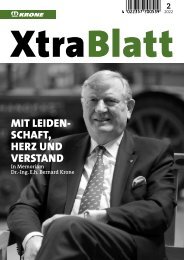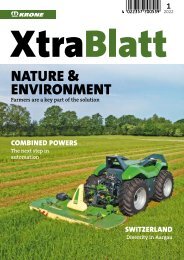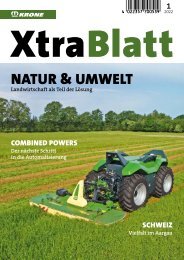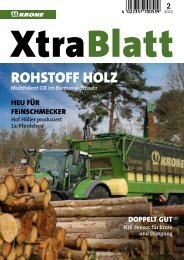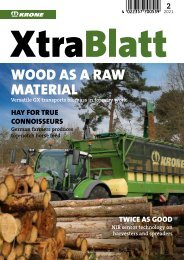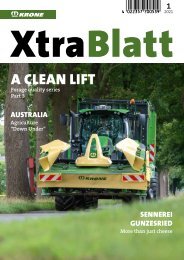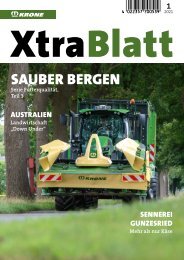XtraBlatt Issue 02-2017
You also want an ePaper? Increase the reach of your titles
YUMPU automatically turns print PDFs into web optimized ePapers that Google loves.
» The digital<br />
advances in agricultural<br />
engineering require<br />
special electricians in<br />
the trade.«<br />
Jürgen Boomgaarden<br />
T<br />
he theme farm machinery is interwoven for generations<br />
with Jürgen Boomgaarden and his family.<br />
His grandfather had a farm machinery dealership and his<br />
father at the end of the 1940s founded a newspaper for<br />
the farm machinery trade. The first issue of the “Eilbote”<br />
appeared in 1949. Since then, the “Eilbote” has become<br />
established as weekly magazine for the farm machinery<br />
sector throughout the German-speaking regions. Jürgen<br />
Boomgaarden took over the management of publisher<br />
and magazine in 1977.<br />
Publisher Jürgen Boomgaarden has known the farm equipment branch<br />
and associated trade very well over decades.<br />
Boomgaarden: For West Germany I estimate the number<br />
of farm machinery firms and blacksmiths at around 7000.<br />
On average, this kind of dealer would have, at the most, 10<br />
to 12 employees. These were mainly individual firms because<br />
the system of branch outlets began first at the end of the<br />
80s. From these have developed the private and cooperative<br />
businesses that we still have now.<br />
<strong>XtraBlatt</strong>: It’s thought provoking that, back then, the<br />
farm equipment trade looked different compared to<br />
now – or how would you describe the situation?<br />
<strong>XtraBlatt</strong>: In those days, every dealership still had several<br />
brands in the showroom. Was it far away from any<br />
exclusivity?<br />
Jürgen Boomgaarden: In the 1970s, there were still large<br />
dealers that delivered not only to the many master blacksmiths,<br />
but also supplied farm machinery traders. I recall a<br />
big dealer in southern Germany that had a massive range<br />
of products, from tractors to the smallest harrow tine. In the<br />
north operated, for example, the firm Mager & Wedemeyer<br />
as large dealer, and still does. The firm Rau, Kirchheim/Teck<br />
was not only a farm machinery manufacturer but also developed<br />
a large-scale dealership. In those days, the system<br />
worked very well because the machinery did not have the<br />
many specifications it now has. Additionally, the variation<br />
within a model programme was substantially smaller.<br />
These big dealerships had respectable stores of spares and<br />
were able to give prompt service to farm machinery traders.<br />
When, at the beginning of the 1980s, unit sales began to fall,<br />
many of the big dealers disappeared from the market. At<br />
the same time, some individual dealerships became even<br />
larger.<br />
<strong>XtraBlatt</strong>: How many firms existed in those days and,<br />
in the 1980s, how many staff members had a mid-sized<br />
farm machinery trading company?<br />
Boomgaarden: Certainly! I remember well dealerships that<br />
had John Deere tractors and Claas combines in their range.<br />
IHC or Fendt and Claas were favoured combinations in trading.<br />
The first company that established exclusivity with its<br />
brand was John Deere in the 80s.<br />
<strong>XtraBlatt</strong>: … and how have the cooperative farm equipment<br />
traders developed?<br />
Boomgaarden: The cooperatives had their regional business<br />
areas and nearly every cooperative traded in farm machinery.<br />
The strength of the cooperative farm machinery<br />
companies increased substantially moving from north to<br />
south. In Schleswig-Holstein, private farm machinery traders<br />
were dominant and always strong. That had a lot to do<br />
with the agricultural infrastructure there.<br />
<strong>XtraBlatt</strong>: Did the infrastructure of farm machinery dealerships<br />
change in 1990 with the unification of Germany?<br />
Boomgaarden: The large private dealerships were quick in<br />
establishing branches in eastern Germany. The cooperatives<br />
55



